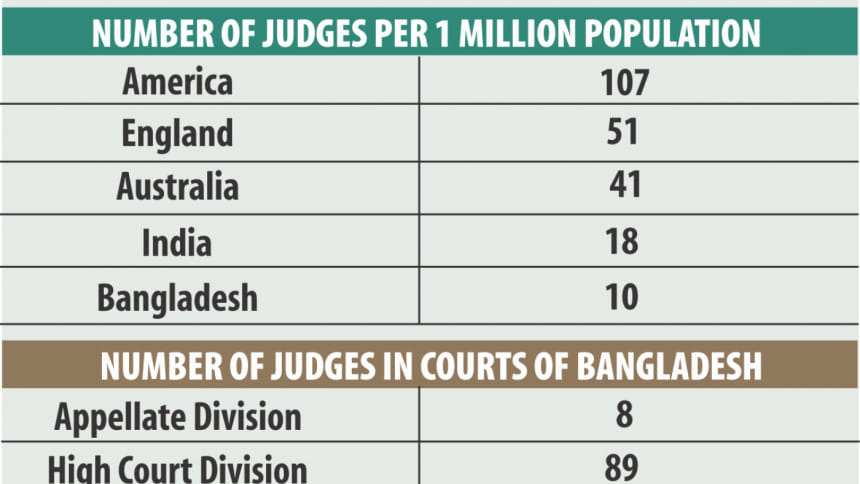To introduce the principle of finality: An urge of a judge

Recently on 17 January, a serious concern has been expressed in the daily Prothom Alo regarding an estimation of the case backlog to five million by the year of 2020. Among others, prominent journalist Mr. Mizanur Rahman Khan suggested to increase the number of judges in order to curb this terrific situation. However, increasing the number of judges is not possible overnight while the number of cases is bouncing thousands to thousands every day.
Bangladesh Judicial Service Commission (BJSC) cannot appoint as many judges as they want unless the Law Ministry sends requisition for it. The Law Ministry can only send requisition against the vacant posts. Regarding the creation of new posts, the Law Ministry can do nothing but to propose and pursue for it. Both the Supreme Court and the Law Ministry are trying to create new posts from the very start of separation of judiciary and it is time consuming indeed. However, appointing more judges hastily seems to be a less sustainable idea and it may affect the quality intake into the judiciary.
For bearing the burden of case backlog, technical instruments like case management, ADR, digital technologies, etc. need to be used in the justice system. To this end, the century-old colonial laws need to be reformed, as urged by the Honourable Chief Justice of Bangladesh Mr. Surendra Kumar Sinha in some recent conferences.
It is to mention that the District Judge of Dhaka, attending the national judicial conference in December 2016 arranged by the Supreme Court, has been urging for the introduction of the principle of finality in the justice system of Bangladesh. In strict sense, the principle of finality refers to the finality of decision passed by a particular court to refrain the parties from availing the privilege of visiting the appellate forum. In liberal sense, it indicates the decision should be final after one or more opportunities of appeal, revision and review. The District Judge basically urges for one or a limited tier of appellate forums redefining the appellate stage for particular cases.
The present justice system in Bangladesh allows appeal, revision and review of a single dispute in different forums which multiply the number of cases. For example, the court of first instance tries a case against which an appeal can be filed, usually, before the district appellate court. If revision is filed before the High Court Division against the decision of district appellate court followed by a subsequent leave to appeal and final appeal before the Appellate Division of the Supreme Court, the total system would eventually multiply one dispute into five cases.

However, there is a possibility that the introduction of finality would reduce the increasing number of cases. If, on the basis of importance and value of particular nature of cases, some are disposed of finally by one appellate court, e.g., District Judge Court, those will not multiply the number of cases before any division of the Supreme Court. Similarly, some important cases can be allowed to go up to the High Court Division for final disposal and certainly not above it. The Appellate Division would only hear appeal in constitutional matters and some other matters as envisaged by article 103 of the Constitution of Bangladesh. This idea of redefining appellate stage can be discussed here with some specific examples. Such as, the District Judge Court can be the final appellate authority for any sentence of imprisonment below one year and any judgement of Assistant Judge Court. Likewise, the High Court Division can be the final appellate court for any sentence below the life imprisonment and any judgement of Senior Assistant Judge Court.
There may have some concerns about the development of jurisprudence on the matters which would be disposed of finally by the District Judge Court as this court cannot contribute to the creation of precedent. Redefining the appellate stages on the basis of scales of punishment and amount of valuation would address this concern. For example, any appeal against a punishment or judgement in same nature of cases which is beyond the said jurisdiction of the District Judge may undergo to the appellate authority of the High Court Division and, thereby, the latter would contribute in the development of precedent in such nature of cases. Countries like Scotland has the highest forum for criminal matters is the 'Scottish High Court of Justiciary' also called as the 'Court of Sessions'. Only the civil and other matters can go before the Court of Appeal and finally to the UK Supreme Court. To conclude, in our country, an extensive research is necessary for categorising the cases suitable to put under the final authority of the District Judge Court and the High Court Division.
The Writer is a Joint District Judge, Bangladesh Judicial Service.

 For all latest news, follow The Daily Star's Google News channel.
For all latest news, follow The Daily Star's Google News channel. 



Comments